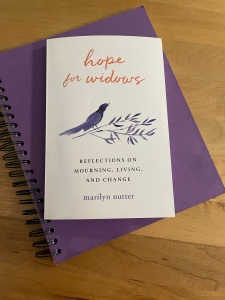Recently, a long time follower gifted me with a book. Knowing I was widowed in 2022, she messaged me and asked if she could send me Hope For Widows – Reflections on Mourning, Living, and Change by Marilyn Nutter. Having read several books on loss, mourning and starting anew, although I was firmly planted in the starting over phase of my journey, I was interested in reading this book, not only for me, but for others going through a similar experience. Starting over is hard. Any nugget of information to help along the way is much appreciated.
As it turns out, I wish I had this book many years ago when I was grappling with anticipatory grief. Marilyn Nutter had a very different experience than mine, becoming a widow unexpectedly while she and her husband, Randy were 3,000 miles from home and just two days prior to Christmas. Conversely, I had years to grieve and mourn the anticipated loss of my husband, Martin. I had plenty of time to plan and prepare and I certainly wasn’t thousands of miles from home during a major holiday when he ascended. That alone must have added to the trauma of losing her spouse. On the other hand, I had time to reflect upon this deeply felt loss. I had time to rage against the disease. I had time to journal my thoughts and feelings. I had time to make peace with the universe. I had time to accept the situation. I had time to decide what my life would look like without him. Time. Time that many widows or widowers do not have. Yet, I found this book helpful with the insights and comfort Nutter offers.

While the book is sixty-five chapters, each is more like a vignette of only two or three pages, followed by what Nutter deems “Treasured Reflections”, where she offers up ideas to ponder and “Treasured Thoughts”, which the reader might journal as a means of recognizing their personal rumination on the subject. In this, there is a type of self-help aspect to the book. Perhaps the most prescient chapter to me is Chapter 10 “His Work Isn’t Finished”. Here, Nutter’s pastor provides a vision contrary to what I and many think of as the deceased’s life being over, finished, done.
Martin’s work is still here in my life, the lives of our family and his co-workers and friends. For me, he’s here in the everyday reminders from our furniture we chose together to the recipes we enjoyed cooking as a couple to his art and photos. During the last few years of his life, he produced hundreds of paintings, so many so that after choosing the ones I wanted to keep and some, which family and friends chose, I donated the remainder to Good Will. Towards the end his paintings became more child-like, almost all of them featuring animals coupled with whimsy. When I donated his works, I thought about how great they would look in a child’s room. I hope that’s where they landed to add cheer to another’s life. Our grandchildren share his artistic bent as well as his athleticism. Former employees have reminisced about what an influence he was on their careers. A former supervisor told me in tears how he thought Martin could do anything. Yes, he lives on in so many ways in so many lives. This thought brings a much needed warmth and comfort to my soul.
There are other passages, which struck a cord such as the ones where grief is not wholly recognized in our society, but something where we shouldn’t cry in public (we should cry whenever we need to) or the mental, emotional and even physical manifestations of grief. These chapters would have certainly aided me during my years of anticipatory grief to know that what I was experiencing is not unusual. So, I thank Renee for the gift. And, since some of you have expressed how you are going through or anticipate loss, I’m passing this on to anyone who may need some encouragement and hope for a brighter tomorrow.
Copyright © 2024 kathysretirementblog.com – All rights reserved.

